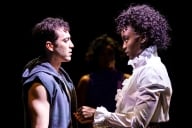You have /5 articles left.
Sign up for a free account or log in.
WASHINGTON -- Sidney A. Ribeau announced Tuesday that he will step down as president of Howard University this year, after five years in office.
The announcement comes at a time when Howard -- long considered a flagship for African-American education -- has faced division on its board and a credit downgrade that raised questions about its financial outlook. Ribeau pushed a controversial academic realignment while he was in office, arguing that such decisions were needed to put the university on better financial footing. And deans have joined faculty members in criticizing the way financial decisions have been made.
Amid the various controversies, there has been no indication that a change was imminent at Howard. Board members had spoken in support of Ribeau (as they did after Tuesday's announcement). The Washington Post noted that his contract had been extended this summer through June 2015. Further, the Post reported that the announcement followed a "tense" meeting of the board, on which some members have suggested that the university is facing a crisis.
Ribeau's announcement made no mention of controversy. It cited the recent launch of new building projects, efforts to strengthen research, and the same academic realignment that was criticized by many faculty members.
Just last week, Moody's downgraded Howard's credit rating from A3 to Baa1 (or from a low to moderate credit risk). Moody's cited a number of financial challenges facing Howard, including budget problems at the university hospital, declines in enrollment (which have since partly rebounded), and dependence on federal support at a time when such support will be difficult to grow. Ribeau said then that the university had a "robust strategy to mitigate soft enrollment,” and plans for long-term changes in the hospital.
Ribeau will not be the first Howard University leader who does not exit on a high note. H. Patrick Swygert announced his departure in 2007 amid faculty calls for his resignation and complaints about his management style. Swygert, the Post noted at the time, had arrived in 1995, following four presidents in six years.
Views on Ribeau
Many who are concerned about Howard's future do not place the blame for its problems on Ribeau, although many also fault him. A recent column in The Hilltop, the student newspaper, said, "We don’t necessarily need a new president. We need a new direction as a university. We need to recognize that the gears of global civilization are spinning faster than ever. Now is the time to act on opportunities, not react to catastrophes."
The column -- by Cameron Clarkson, the opinion editor -- continued: "Howard is in trouble. The problem is simple: we cannot afford our students. As the cost of tuition increases and the American economy tightens around the neck of black people, more and more students are not returning to Howard. In response to this trend, the prevailing theory has been to double down on investments (new dorms, academic buildings, health facilities, etc.) so that we can attract the type of students who can afford to go to Howard for four years.... Frankly, that is not a sustainable solution for Howard University."
On campus Tuesday night, news of Ribeau's departure was just hitting students and professors across campus.
Greg Carr, a member of the Faculty Senate and chair of Afro-American Studies, vigorously defended Ribeau and slammed the news media accounts making dire predictions about Howard's finances. "Sidney Ribeau is one of the finest presidents in the history of this institution," Carr said as he wrapped up a late evening in the campus writing center.
He called the academic realignment "brilliant work" and said Ribeau had moved to shore up the institution's finances and build much-needed new facilities.
Ben Fred-Mensah, an associate professor of international relations, had just learned about Ribeau's retirement in a text message from a student, although Fred-Mensah said he had a vision as he laid in bed Tuesday morning that the president would leave. "May he rest in peace," Fred-Mensah said he texted back.
He said it was too soon to tell if Ribeau's exit would be good or bad, though he noted the "deteriorating nature" of the university's spot in some rankings and its finances. Fred-Mensah noticed the tight budget because of the demise of a departmental lunch and because there used to be a small university allocation for professors' research -- and that is no longer.
"I don't know -- if this is going to be good for Howard, it is difficult to tell," Fred-Mensah said.
Student leaders were likewise mixed.
David Thomas, the executive treasurer of the Arts & Science Student Council, said students had heard negative talk of the university's finances, but those were not defining the student experience. "That has not taken away the shine of Howard," Thomas said.
Torrell Mills, who is this year's Mr. Howard University, a title awarded by a pageant, said students were satisfied with Ribeau's time as president and surprised by his departure.
"I think students were shocked because they were expecting him to stay another four to five years," Mills said.




